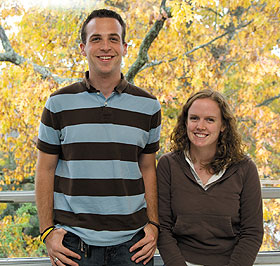  |
| HOME | THIS ISSUE | CALENDAR | GRANTS | BACK ISSUES | < BACK | NEXT > |
Grad students help Guatemalan NGOs attract potential donors via the Web by Cindy Weiss - November 17, 2008 | ||||
| Two master’s degree candidates in economics are on a mission to make the world a better place, starting in Guatemala, where a multitude of non-profit organizations are seeking donors and resources to help develop their country. Justin Podbielski, CLAS ’07, and Maura Williams visited Guatemala last summer as volunteers. They were struck by inefficiencies in the development community, where individual non-profit organizations sometimes compete for the same resources or are unaware of the activities of other non-governmental organizations (NGOs). At first, they saw this as an academic problem — this is what happens in the non-profit community when there are no profit incentives to govern your actions. Then they realized that the reputation of an NGO functioned as an incentive. The more information potential donors have about an organization, and the more transparent the NGO is, the more likely donors are to support it. “If you improve the information flow, you can use access to information as a way to improve the flow of donations,” Podbielski theorized. That’s when the problem moved them to action. They found a solution in a familiar tool: the social networking web site Facebook. Using Facebook as a model, and with the help of Conrad Akier, a computer programmer, they created a central web site to expose organizations in Guatemala to donors and volunteers in North America and Europe, where 90 percent of their support originates. During the past six months, they have contacted 400 agencies in Guatemala and are working with them to fill out surveys (in English and Spanish) about their organizations and create profiles on the new web site. The site is known as Many Efforts, One Goal, or MEOG (www.manyefforts.com). They’ve enlisted help from computer science and engineering and business students at UConn, who are using the project as an academic exercise in computer programming and business planning. They’ve also sought help from the Intellectual Property and Entrepreneurship Law Clinic in registering MEOG as a tax-exempt organization. Last week they held an information session on campus, seeking students to intern or work with MEOG as computer engineers, translators, marketers, grant writers, and recruiters. They hope to bring student interns to Guatemala next summer. Although MEOG’s work is now in Guatemala, the two hope to expand to the rest of Latin America. They recently spent a week in El Salvador, making initial contacts.
A 2007 graduate of the College of Liberal Arts and Sciences, Podbielski majored in political science and economic development and had a minor in mathematics. Williams earned her undergraduate degree at Stonehill College in Massachusetts before coming to UConn for graduate school. Both have been teaching assistants in economics at UConn and have finished their master’s degree coursework. They plan to continue for Ph.D.s here, once they get their Latin American project in order. Neither spoke much Spanish when they first visited Guatemala, but after several extended stays, they now speak fairly fluently. As an incentive for NGOs to fill out surveys about their organization for the MEOG site, Podbielski and Williams are raising money to offer a $500 prize. As part of their fund-raising efforts for MEOG and its partner charities in Guatemala, Podbielski is training for his first marathon. He is coached by Williams, who was a cross-country runner in college. Other MEOG supporters will run, too. The two have also made contact with funders who might support their work. They are marketing their site through blogs, Web-based social networks, and by word-of-mouth. Their goals for the next quarter are to get 500 organizations registered and active on the MEOG site, complete their own non-profit registration, line up funding, and set up student worker task groups. Eventually, they hope to use the MEOG site to highlight Latin American NGOs that are successful in helping their target audiences. They are also developing a system for donors to rate the efficiency of the groups they support. “We want to be the face and voice of the small to medium-sized NGOs there,” says Podbielski. Then NGO profile on MEOG is available online. |
| ADVANCE HOME UCONN HOME |

